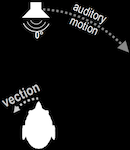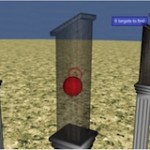
Position:
Professor
Contact:
J.Rieser at vanderbilt.edu
http://www.vanderbilt.edu/psychological_sciences/bio/john-rieser
Affiliations:
Vanderbilt University, Psychology and Human Development; Vanderbilt Kennedy Center for Research on Human Development
Biography
Projects
Embodied Self-Motion Illusions in VR
How can we provide humans with a believable sensation of being in and moving through computer-generated environments (like VR, computer games, or movies) without the need for costly and cumbersome motion platforms or large free-space walking areas? That is, how can we "cheat intelligently" by providing a compelling, embodied self-motion illusion ("vection") without the need for full physical mo...
Navigational Search in VR: Do we need to walk?
Do we need full physical motions for effective navigation through Virtual Environments? Recent results suggest that translations might not be as important as previously believed, which could enable us to reduce overall simulation effort and cost Physical rotations and translations are the basic constituents of navigation behavior, yet there is mixed evidence about their relative importance for co...

